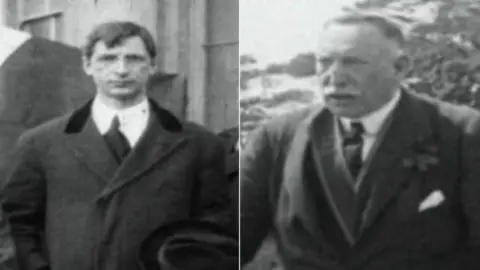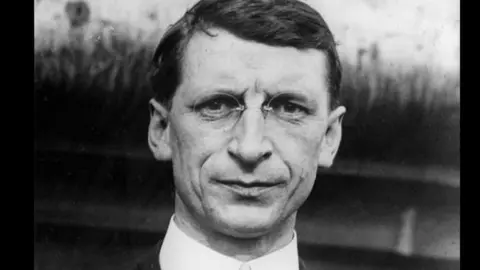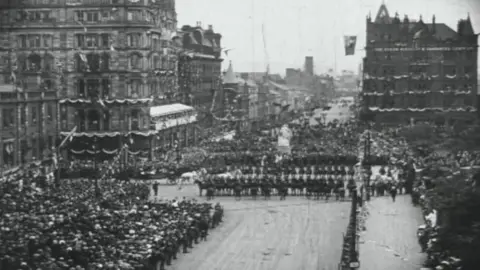NI 100: Meeting that shaped a century of relations
 British Pathé
British PathéA frosty meeting 100 years ago between unionist leader James Craig and republican leader Éamon De Valera set the tone for relations in the new partitioned Ireland.
The discussion took place in Dublin on 5 May 1921, two days after Northern Ireland came into existence.
A political border had just legally come into effect, separating six of Ireland's 32 counties from the rest of the island.
James Craig, who later became Viscount Craigavon, supported the new set-up.
Éamon De Valera vehemently opposed it. It was no surprise their encounter did not go well.
Historian Dr Éamon Phoenix summed it up saying: "There was no meeting of minds and it ended unproductively."
Perhaps the most surprising aspect of the meeting was that it happened at all.
'False pretences'
The Anglo-Irish War was still raging as Irish republicans sought independence from Britain.
At the same time, unionists had successfully ensured the north-east corner of the island would maintain the link with Britain and were wary of any attempts to undermine the new Northern Ireland.
So did De Valera request the meeting? Or Craig?
It seems neither did.
De Valera was later reported to have said: "Craigavon had been told that I had asked to see him and I was told that Craigavon had asked to see me. So we met under false pretences.
"We sat on opposite sides of a table and I said after the first few moments' silence 'well?'"
Historian Tim Pat Coogan records the remarks in his biography of De Valera - Long Fellow Long Shadow.
 Hulton Getty
Hulton GettyDe Valera was involved in the 1916 rebellion against British rule and later became president of Sinn Féin.
In 1919 he was imprisoned but later escaped from Lincoln jail.
During a long political career, he went on to become taoiseach (prime minister) and then president of Ireland.
At the time of his meeting with Craig in May 1921, De Valera was president of Dáil Éireann, the parliament set up in Dublin two years earlier in defiance of British rule.
Craig had just taken over from Sir Edward Carson as unionist leader and was preparing for the first Northern Ireland election.
His meeting with De Valera on 5 May 1921 demonstrated the political gulf between the two men.
"He (Craig) said that De Valera gave him a little geography, a lot of history and some economics, but after about two hours, he'd just reached the reign of King Brian Boru and Craig, who was a business-type man, was getting bored," Dr Phoenix said.
"And eventually there was no meeting of minds.
"But De Valera took one thing away from the meeting - and that was he noticed that Craig treated the British crown, he wrote later, as almost a sacred thing.
"And that influenced De Valera's attitude to the Commonwealth later on. He didn't want to break that link, to take southern Ireland out of the British Commonwealth. Others did that in the late 1940s."
Dr Phoenix said Craig unnerved some hardline unionists in his party by agreeing to the meeting in Dublin.
However, it did not harm his election campaign. Three weeks later, unionists won 40 out of the 52 seats in the new Northern Ireland parliament.
 British Pathé
British PathéOn 7 June 1921, Craig was appointed prime minister and two weeks later King George V arrived in Belfast to officially open the new parliament and give the royal stamp of approval to the new political arrangements.
The following month, there was a truce in the Anglo-Irish War.
In December, a treaty was signed to set up a new Irish Free State in the south of Ireland.
De Valera opposed the agreement as it did not get rid of the border. A civil war broke out between those for and against the Anglo-Irish Treaty.
By the 1930s, De Valera had formed his own party, Fianna Fáil, and became taoiseach in 1932.
By that stage, the separation on the island had been confirmed.
Even though they were political neighbours, there was very little communication between the administrations in Dublin and Belfast.
The tense meeting between De Valera and Craig in 1921 was a taste of what was to follow in the years ahead.

The BBC News NI website has a dedicated section marking the 100th anniversary of the creation of Northern Ireland and partition of the island.
There are special reports on the major figures of the time and the events that shaped modern Ireland available at bbc.co.uk/ni100.
Year '21: You can also explore how Northern Ireland was created a hundred years ago in the company of Tara Mills and Declan Harvey.
Listen to the latest Year '21 podcast on BBC Sounds or catch-up on previous episodes.

